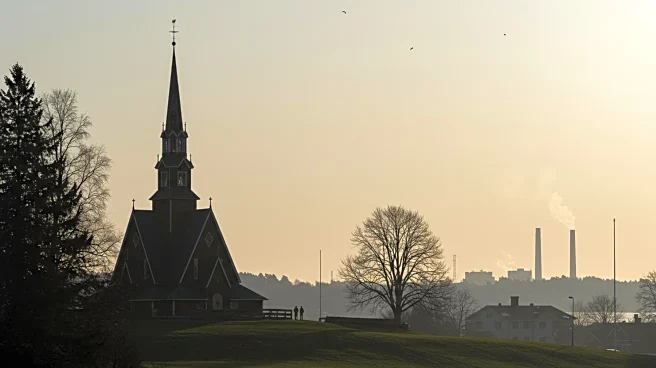What is the story about?
What's Happening?
The historic Kiruna Church in Sweden has been relocated to a new site within the town of Kiruna to accommodate the expansion of the LKAB iron ore mine. The church, dating back to 1912, was moved over a two-day period using remote-controlled flatbed trailers. The relocation was part of a broader effort to move Kiruna's town center due to ground instability caused by mining activities. The move was celebrated with a musical fanfare and attended by King Carl XVI Gustaf. Despite the successful relocation, some residents expressed dissatisfaction with the mining company's handling of the town's relocation, criticizing the destruction of the town and the subsequent celebratory events.
Why It's Important?
The relocation of Kiruna Church highlights the significant impact of industrial activities on local communities and heritage sites. The expansion of the LKAB mine, Europe's largest underground mine, necessitates the relocation of entire town centers, affecting residents' lives and historical landmarks. This event underscores the tension between economic development and preservation of cultural heritage. The mining operations are crucial for Sweden's economy, providing essential materials for the green transition, yet they also pose challenges to local communities and environmental conservation.
What's Next?
The relocation process in Kiruna is expected to continue for several years, with more buildings and infrastructure being moved to accommodate the mine's expansion. LKAB has offered financial compensation and rebuilding options to affected residents, but dissatisfaction remains among some locals. The company plans to further expand its operations, having discovered significant deposits of rare earth elements near the mine. This could lead to increased mining activities and further relocations, potentially exacerbating tensions with local communities and environmental activists.
Beyond the Headlines
The relocation of Kiruna Church raises ethical questions about the balance between economic growth and cultural preservation. The mining activities disrupt traditional Sami reindeer herding and threaten local ecosystems, prompting criticism from environmentalists. The event also reflects broader global challenges in managing industrial expansion while respecting indigenous rights and environmental sustainability.

















